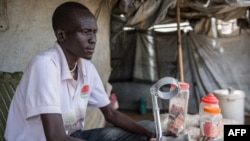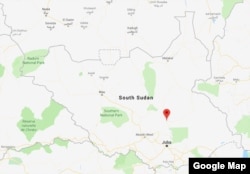A U.S.-based nonprofit is helping many blind South Sudanese see again by hiring a local doctor to perform surgeries on hundreds of patients in the Jonglei State capital Bor.
Sixty-year-old Mary Ayak Thie lost her vision about three years ago. Ayak said after the doctor removed cataracts from her eyes, her vision returned.
“Before the operation, everything was dark and I could not see, but now it is better. I can see my food; I can go the bathroom, by myself. So I thank the doctor who has helped me see again,” she told VOA's "South Sudan in Focus."
Dr. Santino Malang was hired by Partners in Compassionate Care to perform the operations in Bor this week.
“We have screened over 6,000 patients ... and we have done over 172 cataracts as we speak," Malang told VOA. "I feel good because somebody was blind, and can see after the operation, and is able to walk again alone by themselves, it makes both the patients and me happy. "
Patient Mach Athem, 50, said he, too, can see again after successful surgery by Malang.
“If God has brought the doctor to come and help us, all someone like me can say is 'thank you.' I was in a difficult condition, depending on someone else for everything,” Athem told "South Sudan in Focus."
Athem, Ayak and other patients say they are learning to be self-reliant now that they can see again.
Unfortunately, Malang says, not all patients can have their sight restored.
“People with glaucoma, people with corneal scaring, we are not able to restore their sight. So what happens? We just tell them we can't do it and we counsel them. So it is hard for them and we feel bad, but there is nothing more we can do,” Malang told VOA.
Deng Ajak Jongkuch, executive director for Partners in Compassionate Care, said the eye operations began last week and will continue until April 2. He said there was a real need for this type of surgery in Bor.
"We do this work because of the vulnerability of elderly people. They don’t have money to go to Juba, Kenya or Uganda for care. And cataract surgery is a simple 15-minute operation, but untreated, a cataract can destroy somebody’s life. Most patients must have someone to help them, guide them to showers, to the bathroom, to bed and to food. But after the operation, they become independent and that’s very rewarding,” Jongkuch told VOA.
Each surgery costs about $100, far cheaper than just about anywhere else in the world for the same operation. Partners will spend about $50,000 to perform operations in Bor but will extend the surgeries to other areas of Jonglei if the nonprofit receives more donations, Jongkuch said.
“The need for cataract surgeries is huge. We will never finish everybody. I wish we could help the eye center in Bor here. We have a cataracts surgeon; Abraham Tong is in Bor here but he is not doing surgeries because there is no support," Jongkuch told South Sudan in Focus.
He said they hope to go to Pibor, Ayod and Akobo, as well as the other side of the Nile River.
In November, Partners in Compassionate Care successfully operated on more than 150 patients suffering from either cataracts or the eye disease trachoma. Ajak said he has gone back to the U.S. to ask donors for more money. He hopes the South Sudanese-American community will help.
The nonprofit was formed in 2004 in the Midwestern state of Michigan by American David Bowman for the purpose of providing humanitarian health care to South Sudan.






